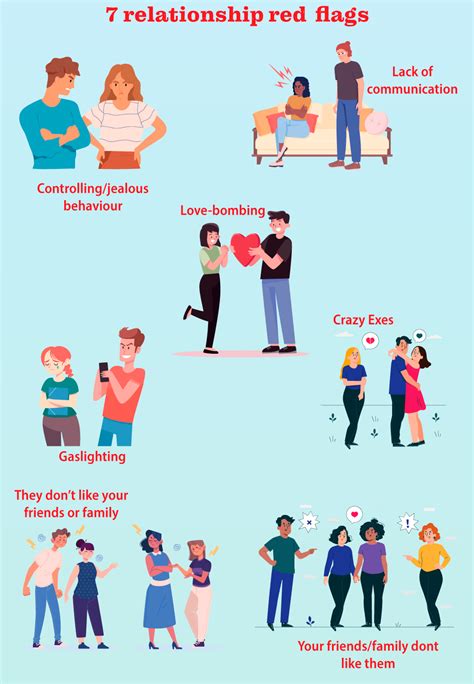
Differentiating between romantic gestures and potential warning signs in a relationship can be challenging, but a recent online discussion highlights 19 behaviors that individuals should be wary of, ranging from excessive flattery to controlling tendencies. These red flags, often masked as affection, can indicate underlying issues that may lead to unhealthy relationship dynamics.
The conversation, sparked by a social media post, prompted users to share their experiences and insights into behaviors they initially perceived as romantic but later recognized as manipulative or indicative of deeper problems. The shared experiences serve as a cautionary guide for those navigating the complexities of modern relationships.
Identifying Red Flags in Relationships: A Guide to Recognizing Warning Signs
Navigating the early stages of a relationship can be an exhilarating experience, filled with romantic gestures and the promise of a deep connection. However, it’s crucial to distinguish genuine affection from behaviors that may signal potential problems down the line. The line between a grand romantic gesture and a controlling tactic can be blurry, making it essential to recognize red flags early on. These warning signs, if ignored, can escalate into unhealthy relationship patterns.
1. Excessive Flattery and Love Bombing:
One of the most commonly cited red flags is “love bombing,” characterized by an overwhelming display of affection, attention, and compliments early in the relationship. While receiving praise and feeling adored might seem ideal, excessive flattery can be a manipulation tactic used to quickly gain control and dependency. As one user noted, “Love bombing is a huge red flag. It’s not genuine; it’s a way to manipulate you into feeling like you owe them something.” This intense initial phase can create an unrealistic expectation and make it difficult to recognize subsequent manipulative behaviors. The sudden withdrawal of this affection can be equally damaging, leaving the recipient confused and seeking to regain the initial high.
2. Isolating You from Friends and Family:
A partner who attempts to isolate you from your support network – friends, family, and colleagues – is exhibiting a significant red flag. This isolation can be subtle, starting with discouraging you from spending time with loved ones or creating conflict when you do. The goal is to make you increasingly dependent on them and less influenced by outside perspectives. “They start making you feel guilty for spending time with your friends or family. It’s a classic control tactic,” one person shared. By cutting you off from your support system, the abuser can more easily exert control over your decisions and beliefs.
3. Constant Need for Reassurance:
While seeking reassurance is normal in any relationship, a partner who constantly demands it may be exhibiting a form of emotional manipulation. This behavior can manifest as repeatedly asking if you love them, questioning your commitment, or requiring constant validation. Over time, this can become emotionally draining and create a dynamic where you feel responsible for their emotional well-being. “It’s exhausting always having to reassure them. It feels like they’re constantly testing you,” a user explained. This need for constant reassurance often stems from insecurity and can be a precursor to more controlling behaviors.
4. Jealousy and Possessiveness:
Jealousy, when excessive, is a clear red flag. A partner who constantly checks your phone, questions your interactions with others, or becomes angry or suspicious without reason is demonstrating possessive tendencies. This behavior stems from a lack of trust and can quickly escalate into controlling and even abusive behavior. “They get jealous over the smallest things. It’s like they don’t trust you at all,” one comment read. Healthy relationships are built on trust and respect for each other’s independence.
5. Controlling Behavior:
Controlling behavior can manifest in various ways, from dictating what you wear to monitoring your whereabouts. A partner who tries to control your decisions, finances, or social interactions is attempting to exert power over you. “They start telling you what you can and can’t do, who you can and can’t see. It’s not love; it’s control,” a user pointed out. This behavior is a major red flag and can lead to emotional and even physical abuse.
6. Gaslighting:
Gaslighting is a form of manipulation where the abuser tries to make you question your sanity and perception of reality. This can involve denying events that happened, distorting your words, or making you feel like you’re overreacting. “They make you feel like you’re crazy. Like you’re imagining things,” one person shared. Gaslighting is a particularly insidious form of abuse because it undermines your self-confidence and makes you doubt your own judgment.
7. Blaming You for Everything:
A partner who consistently blames you for problems, even when they are clearly at fault, is displaying a toxic behavior. This can manifest as deflecting responsibility, shifting blame, or making you feel guilty for their actions. “It’s always your fault. Even when they mess up, they find a way to blame you,” a user explained. This behavior prevents them from taking accountability for their actions and puts you in a constant state of defensiveness.
8. Lack of Empathy:
Empathy is the ability to understand and share the feelings of another person. A partner who consistently lacks empathy, dismissing your feelings or showing little concern for your experiences, is a major red flag. “They don’t care about how you feel. They only care about themselves,” one comment read. This lack of empathy can make it difficult to build a deep emotional connection and can lead to feelings of isolation and invalidation.
9. Quick to Anger:
A partner who is quick to anger, especially over minor issues, may have underlying anger management problems. This can manifest as yelling, shouting, or becoming aggressive. “They blow up over the smallest things. It’s scary,” a user shared. This behavior creates a climate of fear and can be a precursor to more serious forms of abuse.
10. Disrespectful Behavior:
Disrespectful behavior can take many forms, from insults and name-calling to belittling your accomplishments or dismissing your opinions. A partner who consistently disrespects you is showing a lack of regard for your worth and value. “They put you down in front of others and make you feel small,” one person noted. Respect is a fundamental component of any healthy relationship.
11. Unwillingness to Compromise:
A healthy relationship requires compromise and the ability to find solutions that work for both partners. A partner who is unwilling to compromise or always insists on getting their way is demonstrating a lack of respect for your needs and desires. “It’s always their way or the highway. They never want to compromise,” a user explained. This inflexibility can lead to resentment and conflict.
12. Unrealistic Expectations:
Setting unrealistic expectations can create undue pressure and stress within a relationship. This could involve expecting you to be perfect, to always be available, or to fulfill all their emotional needs. “They expect you to be everything for them. It’s too much pressure,” one comment read. Healthy relationships involve mutual support and understanding, but not the expectation that one person can solve all of the other’s problems.
13. Dishonesty and Lying:
Honesty and trust are essential for a healthy relationship. A partner who lies, even about seemingly small things, is undermining the foundation of trust. “You catch them in lies all the time. It makes you question everything,” a user shared. Dishonesty can erode trust and create a climate of suspicion.
14. Substance Abuse Issues:
Substance abuse can significantly impact a relationship, leading to unpredictable behavior, financial problems, and emotional distress. A partner who struggles with substance abuse may be unable to maintain healthy boundaries or fulfill their responsibilities. “Their drinking or drug use is out of control, and it affects everything,” one person noted.
15. Unresolved Trauma:
Unresolved trauma can manifest in various ways, including emotional instability, difficulty with intimacy, and unhealthy coping mechanisms. While it’s important to be supportive, it’s also crucial to recognize when a partner’s unresolved trauma is negatively impacting the relationship. “They have a lot of baggage from their past, and it affects how they treat you,” a user explained. Seeking professional help can be beneficial in addressing unresolved trauma.
16. Financial Control:
Controlling someone’s finances, whether through restricting access to money or demanding to know every purchase, is a form of abuse. This behavior can trap the victim in the relationship and make it difficult to leave. “They control all the money and make you feel like you have to ask permission for everything,” one comment read. Financial independence is essential for maintaining autonomy and security.
17. Using Guilt Trips:
Guilt trips are a form of emotional manipulation where the abuser tries to make you feel guilty for their actions or for not meeting their expectations. This can involve playing the victim, exaggerating their suffering, or making you feel responsible for their happiness. “They always make you feel guilty for not doing what they want,” a user shared.
18. Moving Too Fast:
Rushing into a relationship can be a sign of underlying issues. This might involve pushing for a commitment too early, discussing marriage within weeks of meeting, or pressuring you to make major life decisions quickly. “They wanted to move in together after only a month. It was too much, too soon,” one person noted.
19. Disregarding Boundaries:
Boundaries are essential for maintaining healthy relationships. A partner who consistently disregards your boundaries, whether physical, emotional, or social, is demonstrating a lack of respect for your needs and limits. “They don’t respect your boundaries. They push and push until you give in,” a user explained.
Recognizing and Addressing Red Flags
Identifying these red flags is the first step towards protecting yourself from potentially harmful relationships. If you recognize any of these behaviors in your own relationship, it’s important to address them directly. This may involve having an open and honest conversation with your partner about your concerns. However, if the behavior persists or escalates, it’s crucial to seek help from a trusted friend, family member, or professional therapist.
It’s also important to remember that you are not responsible for changing your partner’s behavior. If they are unwilling to acknowledge their actions or seek help, it may be necessary to end the relationship. Prioritizing your own safety and well-being is paramount.
According to relationship experts, paying attention to your gut feeling is crucial. If something feels off or uncomfortable, it’s essential to trust your intuition. Don’t dismiss your concerns or rationalize away red flags. It’s better to be cautious and protect yourself than to ignore warning signs that could lead to a harmful relationship.
Seeking professional guidance from a therapist or counselor can provide valuable support and tools for navigating relationship challenges. A therapist can help you identify unhealthy patterns, develop healthy communication skills, and make informed decisions about your relationships.
Ultimately, recognizing red flags and taking appropriate action is essential for fostering healthy and fulfilling relationships. By being aware of these warning signs, you can protect yourself from potential harm and create a foundation for lasting love and respect.
The Importance of Self-Reflection and Awareness
Beyond identifying red flags in others, it is also essential to engage in self-reflection and examine your own behaviors and patterns in relationships. Are you setting healthy boundaries? Are you communicating your needs effectively? Are you attracted to certain personality types that may be more prone to exhibiting red flags? Understanding your own tendencies and vulnerabilities can help you make more informed choices and build healthier relationships.
Furthermore, it is important to remember that no one is perfect, and everyone makes mistakes. However, the key is to be willing to learn from those mistakes and strive to improve your behavior. A healthy relationship involves mutual growth and a commitment to addressing challenges in a constructive manner.
The online discussion sparked by this topic highlights the importance of sharing experiences and supporting one another. By sharing our stories, we can help others recognize red flags and make informed decisions about their relationships. We can also create a culture of awareness and accountability, where unhealthy behaviors are challenged and healthy relationships are celebrated.
Breaking the Cycle of Unhealthy Relationships
Recognizing red flags is not just about avoiding bad relationships; it’s also about breaking the cycle of unhealthy patterns that can perpetuate across generations. Individuals who have experienced unhealthy relationships in the past may be more likely to repeat those patterns in the future, unless they actively work to address the underlying issues.
This may involve seeking therapy to process past trauma, learning healthy communication skills, and developing a stronger sense of self-worth. It may also involve setting firmer boundaries and being more selective about who you allow into your life.
Breaking the cycle of unhealthy relationships requires a commitment to self-growth and a willingness to challenge ingrained patterns. It also requires a supportive community of friends, family, or professionals who can provide guidance and encouragement along the way.
Cultivating Healthy Relationships
While it’s important to be aware of red flags, it’s equally important to focus on cultivating healthy relationship habits. This includes practicing open and honest communication, setting clear boundaries, showing empathy and compassion, and respecting each other’s independence.
Healthy relationships are built on a foundation of trust, respect, and mutual support. They require effort and commitment from both partners, and they involve navigating challenges in a constructive and collaborative manner.
By focusing on cultivating healthy relationship habits, you can create a foundation for lasting love and fulfillment. This includes prioritizing your own well-being, setting realistic expectations, and being willing to compromise and grow together.
In conclusion, recognizing red flags is an essential skill for navigating the complexities of modern relationships. By being aware of these warning signs and taking appropriate action, you can protect yourself from potential harm and create a foundation for healthy and fulfilling relationships. Remember to trust your intuition, seek support when needed, and prioritize your own safety and well-being. The online discussion surrounding this topic highlights the importance of sharing experiences and supporting one another in the pursuit of healthy and fulfilling relationships.
Frequently Asked Questions (FAQ)
1. What is “love bombing” and why is it considered a red flag?
“Love bombing” refers to an overwhelming display of affection, attention, and compliments at the beginning of a relationship. It’s considered a red flag because it’s often a manipulation tactic used to quickly gain control and dependency. The intense initial phase can create unrealistic expectations, and the sudden withdrawal of this affection can be emotionally damaging.
2. How can I tell the difference between genuine affection and controlling behavior?
Genuine affection is usually consistent and respectful of your boundaries, independence, and personal space. Controlling behavior often involves attempts to isolate you from friends and family, monitor your whereabouts, dictate your decisions, or exert power over you. Pay attention to whether the behavior feels supportive and empowering or restrictive and oppressive.
3. What should I do if I recognize red flags in my relationship?
If you recognize red flags in your relationship, the first step is to have an open and honest conversation with your partner about your concerns. Clearly communicate how their behavior is affecting you. If the behavior persists or escalates, seek help from a trusted friend, family member, or professional therapist. If you feel unsafe, prioritize your safety and consider ending the relationship.
4. Is it possible for someone exhibiting red flags to change their behavior?
Yes, it is possible for someone exhibiting red flags to change their behavior, but it requires a genuine willingness to acknowledge their actions, take responsibility for their behavior, and seek professional help if needed. Change requires commitment, effort, and often therapy or counseling. However, you are not responsible for changing your partner’s behavior, and you should prioritize your own well-being.
5. Where can I find help if I am in an abusive or unhealthy relationship?
If you are in an abusive or unhealthy relationship, there are numerous resources available to help. You can contact the National Domestic Violence Hotline, local domestic violence shelters, mental health professionals, or support groups. It’s important to reach out for help and create a safety plan if you feel unsafe. Remember that you are not alone, and help is available.
Additional Resources:
- The National Domestic Violence Hotline: 1-800-799-SAFE (7233)
- RAINN (Rape, Abuse & Incest National Network): 1-800-656-HOPE
- Loveisrespect: 1-866-331-9474
Expanding on the Red Flags
Beyond the initial 19 red flags, there are subtler indicators that can suggest underlying issues in a relationship. Recognizing these nuances requires careful observation and a willingness to confront uncomfortable truths.
-
Inconsistent Communication: Sporadic or unreliable communication can be a sign of disinterest, avoidance, or even deception. While everyone has busy periods, a pattern of inconsistent communication, especially when coupled with excuses or justifications, can indicate a lack of commitment or respect for the relationship.
-
Lack of Accountability: A partner who consistently avoids taking responsibility for their actions, making excuses, or blaming others demonstrates a lack of maturity and willingness to grow. Accountability is crucial for resolving conflicts and building trust.
-
Unwillingness to Discuss the Future: If your partner avoids discussing long-term plans or seems hesitant to commit to the future of the relationship, it may indicate a lack of serious intentions. While it’s normal to take time to assess compatibility, a consistent refusal to discuss the future can be a sign of a deeper issue.
-
Emotional Immaturity: Emotional immaturity can manifest in various ways, including difficulty managing emotions, reacting impulsively, lacking empathy, or engaging in childish behavior. A partner who consistently demonstrates emotional immaturity may struggle to handle the demands of a mature relationship.
-
Discomfort with Vulnerability: Vulnerability is essential for building intimacy and emotional connection. A partner who is consistently uncomfortable with sharing their feelings, opening up emotionally, or being vulnerable may struggle to form a deep and meaningful bond.
-
Ignoring Your Needs and Concerns: A partner who consistently ignores your needs and concerns, dismissing your feelings or failing to prioritize your well-being, is demonstrating a lack of respect and empathy. Your needs should be valued and addressed in a healthy relationship.
-
Constant Criticism: While constructive feedback can be helpful, constant criticism and nitpicking can erode your self-esteem and create a negative dynamic. A partner who consistently criticizes you, rather than offering support and encouragement, may be projecting their own insecurities onto you.
-
Controlling the Narrative: A partner who consistently tries to control the narrative, distorting events or manipulating your perception of reality, is engaging in a form of emotional abuse. This can make you question your sanity and undermine your self-confidence.
-
Using Silence as a Weapon: The silent treatment, or withholding affection and communication as a form of punishment, is a manipulative tactic. This behavior is emotionally damaging and prevents healthy conflict resolution.
-
Making Empty Promises: A partner who consistently makes promises they don’t keep, or fails to follow through on their commitments, is demonstrating a lack of reliability and respect. Broken promises can erode trust and create a sense of disappointment.
Recognizing these subtler red flags can help you identify potential issues early on and make informed decisions about the future of the relationship. It’s important to trust your intuition and prioritize your own well-being.
Building Healthy Communication Skills
Effective communication is the cornerstone of any healthy relationship. It involves expressing your needs and feelings clearly and respectfully, listening actively to your partner’s perspective, and working together to resolve conflicts in a constructive manner.
-
Express Yourself Clearly: Use “I” statements to express your feelings and needs without blaming or accusing your partner. For example, instead of saying “You always make me feel like I’m not important,” try saying “I feel unimportant when you don’t listen to my concerns.”
-
Listen Actively: Pay attention to what your partner is saying, both verbally and nonverbally. Avoid interrupting, judging, or planning your response while they are speaking. Show empathy and understanding by acknowledging their perspective.
-
Validate Your Partner’s Feelings: Even if you don’t agree with your partner’s perspective, it’s important to validate their feelings. Acknowledge that their feelings are valid, even if you don’t share them. This can help them feel heard and understood.
-
Choose the Right Time and Place: Avoid discussing sensitive topics when you are tired, stressed, or distracted. Choose a time and place where you can both focus on the conversation without interruptions.
-
Take Breaks When Needed: If the conversation becomes too heated, take a break to cool down and collect your thoughts. This can prevent the situation from escalating and allow you to approach the conversation with a calmer perspective.
-
Seek Professional Help: If you are struggling to communicate effectively with your partner, consider seeking professional help from a therapist or counselor. A therapist can provide guidance and tools for improving communication skills.
By developing strong communication skills, you can create a more open, honest, and fulfilling relationship.









